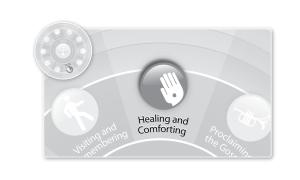Part IV of our series on Healing and Comforting
 There’s some good news, according to our last post, about illness: it is always the platform for revealing the glory of God. That’s what healing is all about, the restoration of God’s image in every part of the human body – spirit, soul, and body.
There’s some good news, according to our last post, about illness: it is always the platform for revealing the glory of God. That’s what healing is all about, the restoration of God’s image in every part of the human body – spirit, soul, and body.
So why isn’t everyone healed, then?
If illness mars the image of God in us, and if God desires us to bear his image, then why do some illnesses remain?
Some are quick to claim a “lack of faith.” And clearly the Bible talks about that. You can see that in Mark 6:1-6 where, because of the unbelief of many, Jesus was unable to perform a “mighty work” though he did still heal some. And you can see the effect of the presence of faith on healing, like in Mark 9:20-23, where Jesus heals a demon-possessed boy and proclaims that, “everything is possible for him who believes.”
But, just as discipleship involves submitting our whole selves to Jesus (and not just that which is “spiritual), so, too, does healing. It’s not just about submitting our illnesses to Jesus. What he starts in one part of us – whether body or spirit – he intends to bring to completion through our whole existence.
Healing is about submitting our whole lives to his care. It is about hospitality, remember? It’s not about miracles.
But the Bible also portrays Jesus as not healing when he could. Check out Mark 1:32-39. Here, after a full day of healing and ministry, Jesus leaves one town (where “everyone” was looking for him) and goes to another. You can picture the line of patients Jesus has waiting for him there! But Jesus leaves. He is not trying to heal everyone in town but rather to raise up a witness for himself in every town.
Surely today, after two thousand years of the Christian faith growing and penetrating the world’s cultures, he has enough ambassadors that he could heal everyone if he wanted to – or at least everyone who had faith – right?
The apostle Paul shows that even Jesus’ lack of healing is still about human beings bearing his image:
“So to keep me from becoming conceited because of the surpassing greatness of the revelations, a thorn was given me in the flesh, a messenger of Satan to harass me, to keep me from becoming conceited. Three times I pleaded with the Lord about this, that it should leave me. But he said to me, ‘My grace is sufficient for you, for my power is made perfect in weakness.’ Therefore I will boast all the more gladly of my weaknesses, so that the power of Christ may rest upon me. For the sake of Christ, then, I am content with weaknesses, insults, hardships, persecutions, and calamities. For when I am weak, then I am strong. (2 Corinthians 12:7-10, emphasis mine)
The Bible never says what Paul’s “thorn in the flesh” was. It may not have even been a bodily illness—we just don’t know. But the principle Paul lays out here applies to bodily illness, too: We humans have an amazing ability to take blessings of God—like health—and use them as means of sinful self-sufficiency and ignoring God.
So sometimes we bear the image of God by bearing illness, either for a time or permanently, so that we can show the world – and ourselves – that his grace is sufficient, his strength made perfect able to keep us from falling.
Does this change how you feel about an illness of yours or someone close to you? How might you be used by God to help someone bear God’s image by bearing illness?











My mother died of advanced Multiple Sclerosis (MS). She contracted the illness when I was a small child and it got progressively worse, ultimately leading to her demise. She was quadriplegic and my father had to feed her daily for the last several years of her life. My mother was a good Christian woman. I remember that faith healers visited our house and claimed the reason she could not be healed was that she lacked faith (these people didn’t even know her!). I remember my father physically ejecting these people from the house. Eventually, my mother accepted her illness. She rarely complained about it. At her funeral, our Methodist brothers and sisters at the church told me that my mother’s illness witnessed to God grace in her life and was an encouragement to others to bear under their own illnesses. She never complained and was cheerful through all of it towards the end. What better testimony could there be to the sufficiency of the Holy Spirit?
Amen, Dr. Val. Well said. And for your mother, well lived.
Pingback: We Do Not Pray In Order to Be Healed | Rev. Eric Foley